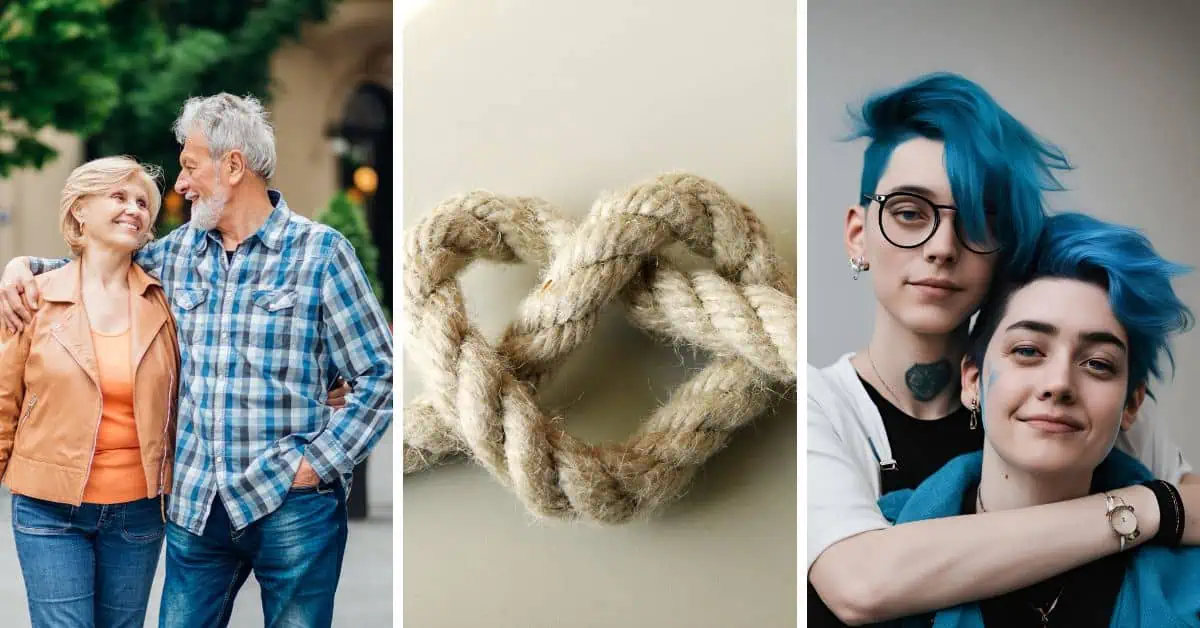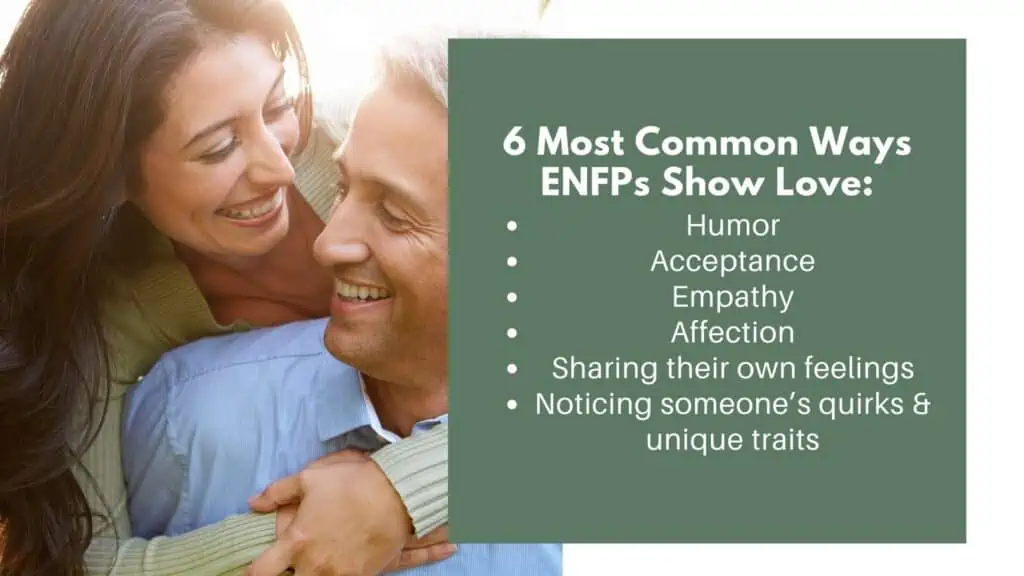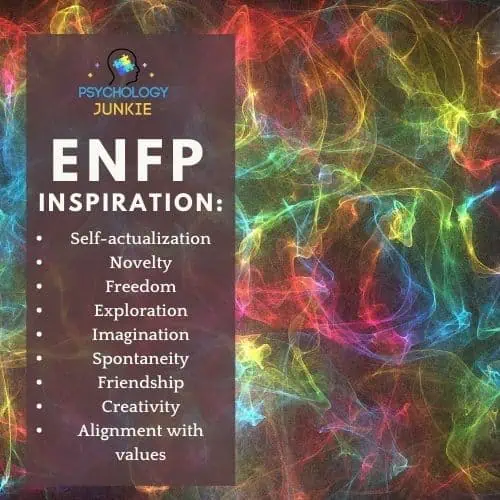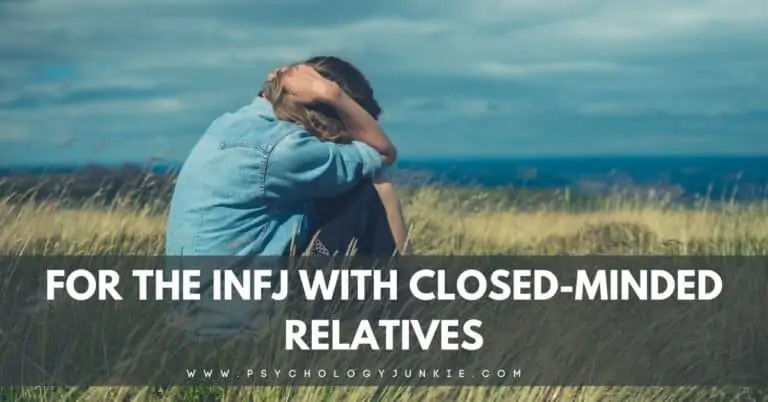How ENFPs Say “I Love You”
ENFPs, who I like to call “The Visionaries”, have a way of showing love that really stands out. Known for their imagination, enthusiasm, and idealism, ENFPs want to bring out the best in the people they love. They want you to feel like anything is possible and you really can achieve your highest potential.
In more practical ways, the ENFP is like that one friend who shows up with a surprise coffee just because they thought you might need it. If you’re lucky enough to have an ENFP in your life, you’ll find that their expressions of affection are as colorful and varied as their personalities.

Not sure what your personality type is? Take our personality questionnaire here. Or you can take the official MBTI® here.
A Quick Intro to the ENFP:
But before we dive right in, who are the ENFPs? In the world of Myers-Briggs, ENFPs are Extroverts, iNtuitives, Feelers, and Perceivers. They are energized by engaging with people and activities around them. As Intuitives, they are inspired by concepts and ideas. Thanks to their Feeling preference, they are driven to live in alignment with their values. And as Perceivers, they and adaptable and spontaneous more than cautious and planful. I know that was a lot of rapid-fire information, but it gives you a general idea of the trademark ENFP characteristics.
Now. How do these types show they care? Let’s move on…
How ENFPs Say “I Love You”
1. Through Inspirational Acts
Imagine you’re having a glum day, and everything feels like it’s painted in shades of gray. Then, out of the blue, your ENFP friend or partner sweeps in with a burst of color, holding a vision board filled with ideas and quotes tailored just for you. They don’t just tell you they love you; they show it by lighting up your world with possibilities and dreams, turning your day around with their vivid imagination.
Now that might be a bit of an exaggerated example for some, but it’s not unrealistic for an ENFP. They really do want to inspire you. Linda Berens, the psychologist who wrote Understanding Yourself and Others™: An Introduction to the Interaction Styles, says that ENFPs are “Get Things Going” personality types. This means they have a positive, upbeat energy and like getting people involved and excited about life. And if they love you, they want you to feel inspired, excited, and hopeful about all that life has to offer.
For ENFPs, love means encouraging you to reach for the stars, even when you’re down in the dumps. They have an innate talent for spotting a silver lining and will go to great lengths to make sure you see it too. Whether it’s through introducing you to a new hobby, sharing a book they know you’ll adore, or simply engaging in deep, thought-provoking conversations, ENFPs want to broaden your horizons and help you grow.
2. Creating Space for Authenticity
In a society where so much emphasis is placed on fitting in, ENFPs prize individuality above all. When they care about you, they’re more interested in meeting the raw, unpolished version of you rather than the one you think the world wants to see. They create a safe space for you to be utterly yourself, free from judgment or expectation. This acceptance is perhaps one of the most profound ways an ENFP says “I love you.”
“I want to see someone’s true colors, not who they try to be to impress other people. I like it when someone invites me into their vulnerabilities, secret longings, the things they don’t share with everyone else. I don’t shy away from the dark side either.” – Kori, an ENFP
3. Prioritizing Surprises
One of my good friends, Sarah, is an ENFP. One summer several years ago my daughter was at her dads for six weeks across the country. I was so excited to get her home, but I had almost no time to prepare because my schedule had been so packed. When I went to the airport to pick my daughter up, Sarah sneaked over to my house, brought a box of Krispy Kreme donuts, left them on the porch, and used chalk to write “Welcome Home!” all over the driveway.
ENFPs LOVE surprises, giving and receiving them. And when it comes to relationships, they’ll go above and beyond to make your day special in unexpected ways. From spontaneous weekend trips to surprise gifts and gestures, ENFPs love the thrill of doing the unexpected to make someone feel noticed and valued.
4. Helping You See Windows of Opportunity
ENFPs are the people who will spot a pathway of opportunity in the darkest situation. They want to be that light in the dark tunnel that can help you see possibilities when it feels like the walls are closing in on you. When you’re feeling stuck and unsure of what to do next, an ENFP will encourage you to explore different avenues and try new things. They’ll see the potential in you even when you can’t and will push you to step out of your comfort zone.
Common Hardships of ENFPs in Relationships:
Despite their optimistic approach to love and life, ENFPs face their own set of challenges in relationships. Recognizing these struggles can lead to healthier, more understanding partnerships. Here are three common hardships ENFPs might encounter, alongside ways they can seek support or cope:
- Losing Freedom and Feeling Trapped: ENFPs crave independence and the ability to explore life’s endless possibilities. Being in a relationship that limits their freedom or makes them feel confined can be particularly stifling. How to get help: Communication is key. ENFPs should have open conversations with their partners about their need for independence and space. Establishing boundaries and mutual understanding is hugely important. ENFPs should avoid partners who seem micro-managing, controlling, or intentionally condescending.
- Always Being Expected to Be the “Sunny” One: Due to their naturally enthusiastic and positive outlook, ENFPs can feel pressured to maintain this persona even when they’re struggling. This expectation to always be the upbeat and motivating one can be draining. How to get help: It’s important for ENFPs to remember that it’s okay not to be okay. Seeking support from loved ones, therapists, or support groups where they can express their true feelings without the pressure to perform can be incredibly liberating. And partners of ENFPs shouldn’t balk when the ENFP is having an occasional rough patch. Instead, offer support and patience and give them space if needed to work through their emotions.
- When Their Partner Doesn’t Share Their Values: ENFPs are driven by a deep sense of personal values and ethics. A relationship where their partner does not share or respect these core beliefs can lead to discontent, hurt, and disappointment. How to get help: Engaging in open, respectful discussions about each other’s values can be enlightening. In cases where differences are too vast, it might be helpful for ENFPs to seek counsel from a relationship coach or therapist to navigate these challenges. In some situations, accepting that not every difference can be reconciled is also part of the process, leading to growth and better alignment in future relationships.
5 Ways to Show an ENFP You Care:
- Engage in Deep Conversations: Take the time to explore ideas and dreams together. ENFPs thrive on connection and meaningful interaction, so showing interest in their thoughts and feelings demonstrates your care and commitment.
- Support Their Adventures: Whether it’s a new business idea or a travel dream, backing their ventures shows you believe in their potential and are willing to be part of their exploratory world.
- Express Appreciation Openly and Often: ENFPs pour a lot of themselves into their relationships. Verbal affirmations and genuine thank-you’s for their efforts and qualities make them feel valued and loved.
- Surprise Them: Because ENFPs love surprises, planning unexpected gestures or gifts can be a powerful way to show your affection. It doesn’t have to be grand; even small surprises can make a significant impact.
- Give Them Space to Be Themselves: Encouraging and accepting their need for independence and self-expression shows your understanding and respect for their individuality. This space allows ENFPs to feel truly loved for who they are, not just who they’re with you.
What Do You Think?
Was this article helpful to you? Do you have any insights, perspectives, or experiences to share? Let us and other readers know in the comments!
Find out more about your personality type in our eBooks, Discovering You: Unlocking the Power of Personality Type, The INFJ – Understanding the Mystic, The INTJ – Understanding the Strategist, and The INFP – Understanding the Dreamer. You can also connect with me via Facebook, Instagram, or Twitter!
References:
Understanding Yourself and Others™: An Introduction to the Interaction Styles by Linda V. Berens (InterStrength, 2008)
Please Understand Me: Character & Temperament Types by David Keirsey and Marilyn Bates (Prometheus Nemesis Book Company, 1984)









